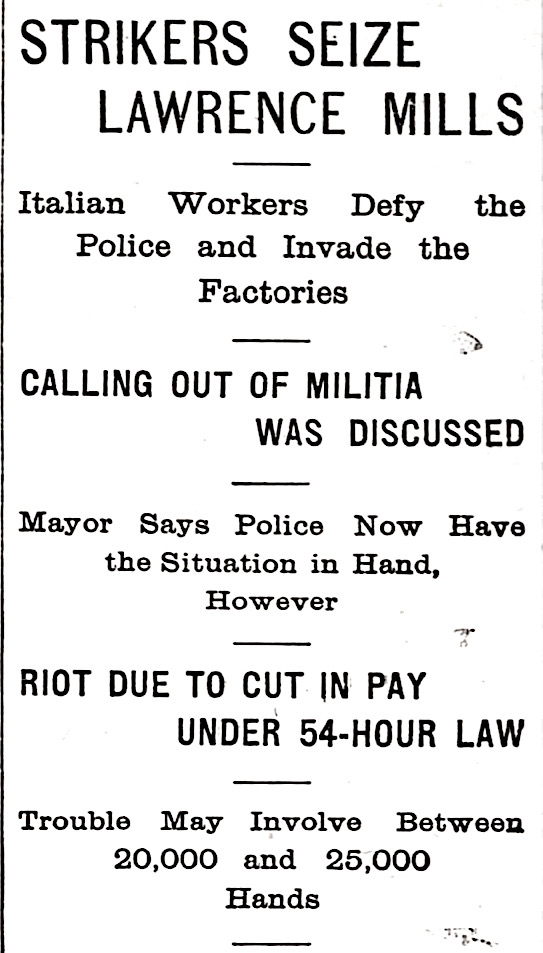 —————
—————
Hellraisers Journal – Sunday January 14, 1912
Lawrence Textile Workers Stage Walk-Out Due to Short Pay
From the Boston Evening Transcript of January 12, 1912:
Special to the Transcript:
Lawrence, Jan. 12-The mill district of this city was thrown into a state of great excitement today by a riotous outbreak on the part of about five hundred Italians, who left their work at the Wood, Ayer and Washington mills of the American Woolen Company because they objected to a reduction of two hours pay a week under the workings of the new 54-hour law. Before the trouble ended several persons had been injured, none seriously, a number of girl operatives had fainted and six arrests had been made by the police. The mill agents hastily looked things over and found that so many operatives had quit work through fear of the angry Italians that it was decided to close down the Wood and Ayer mills at once. The Washington mills and those of the Lawrence Duck Company, to which the disturbance extended, were kept in operation, although 800 operatives at the Washington mills and 400 at the duck mills stopped work after the riot. As the Wood mill employs 6000 hands and the Ayer mill 3500, nearly 11,000 operatives were idle this afternoon.
Just what effect today’s rioting will have on the general situation is problematical. Some of the mill agents expressed the opinion that it might make the more responsible operatives realize the dangers which would accompany a general strike and thus might make it easier to reach an amicable agreement. The union leaders were not prepared this afternoon to make any statements as to their probable attitude, but it was evident that the disturbances today had produced a sobering effect. No formal meeting of union workers had been called early this afternoon, but it was generally expected that such meetings would be held very soon to discuss the situation and decide what action would be taken. The mill agents intimated that they would open all the mills tomorrow as usual, including the Wood and Ayer mills. How many of their operatives will be on hand to go to work cannot yet be foretold. The six men arrested will appear in court tomorrow.
Two hundred operatives at the Pacific Mills quit work this afternoon, the majority of whom were employed in the examining room. At the Farwell bleachery, School Committeeman John Breen addressed a band of Syrians, this afternoon, and succeeded in inducing them to disband. About fifty Farwell bleachery employees quit work this afternoon on account of the wage reduction.
[…..]
Amazing Mixture of Races in Mills
———-Forty-Five Languages Spoken Within a Mile Radius–Only Chicago and Fall River Have as Large a Per Cent Foreign-Born–Foreign Labor Mostly Unskilled
Within a mile radius of the mills are spoken forty-five languages, including their sub-divisions, and there are people living within this area representing fifty-one different countries of Europe, Asia and Africa. It is safe to say that there are more languages spoken within the Wood or Washington mills than in any one spot of equal size in the world. Whereas Lawrence covers an area of seven and a quarter square miles, the races represented live within two square miles of area, the congested district being close to the mills. And Lawrence presents unique conditions in that all the different nationalities live close together, as many as six and seven distinct races often living in one tenement block. While in the larger cities, as in New York and Chicago, there are more races represented, they are also more widely scattered, being grouped in sections. In Lawrence they all live together even as they work together. Only Chicago and Fall River has as large a percentage of foreign-born citizens to their population as has Lawrence.
One is also impressed by the number of women in excess of men passing along the streets. The foreign-born element of women in Lawrence is thirty per cent greater than that of the men, making the town a force in the dubbing of New England a weary girl-congested land, whereas, in other countries where there are large foreign-born percentages to the population, it often happens that the men are in excess of the women of their races in the ratio of four to one.
As in Pittsburgh and the Pennsylvania mining districts, Lawrence is again exceptional in that the women of the Slavic and Finnish races and those speaking the Romance languages often come here and obtain work in the mills, leaving their husbands at home with the young children. Many Italian and Syrian women are at work, aiming to bring their husbands and families later, such economic conditions being made possible by the fact that seventy per cent more woman are employed in the mills than men.
[…..]
[Emphasis added.]
~~~~~~~~~~~~~~~~~~~~~~~~~
SOURCE & IMAGE
Boston Evening Transcript
(Boston, Massachusetts)
-Jan 12, 1912, pages 1 & 3
https://www.newspapers.com/image/735626337/
https://www.newspapers.com/image/735626355/
See also:
Jan 12, 1912, Boston Eve Transcript-Lawrence Textile Strikers Seize the Mills
https://www.newspapers.com/clip/92570237/jan-12-1912-boston-eve/
(cont.)
https://www.newspapers.com/clip/92570560/jan-12-1912-boston-eve/
Tag: Lawrence Textile Strike of 1912
https://weneverforget.org/tag/lawrence-textile-strike-of-1912/
The Rebel Girl
An Autobiography, My First Life (1906-1926).
-by Elizabeth Gurley Flynn
International Publishers, 1973
(Chapter Three-The Lawrence Textile Strike, p127)
https://books.google.com/books?id=TK2y0I-E9EkC
Bill Haywood’ Book
The Autobiography of William D. Haywood
International Publishers, 1929
-page 239 (#243)
https://babel.hathitrust.org/cgi/pt?id=mdp.39015041365316&view=page&seq=243
~~~~~~~~~~~~~~~~~~~~~~~~~
Die Internationale – Italian

